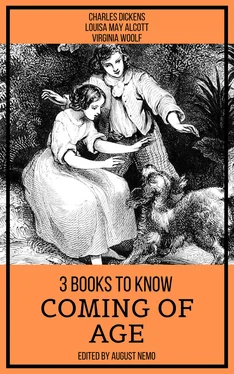"Good again!" cried Uncle Pumblechook. "Well put! Prettily pointed! Good indeed! Now Joseph, you know the case."
"No, Joseph," said my sister, still in a reproachful manner, while Joe apologetically drew the back of his hand across and across his nose, "you do not yet—though you may not think it—know the case. You may consider that you do, but you do not, Joseph. For you do not know that Uncle Pumblechook, being sensible that for anything we can tell, this boy's fortune may be made by his going to Miss Havisham's, has offered to take him into town to-night in his own chaise-cart, and to keep him to-night, and to take him with his own hands to Miss Havisham's to-morrow morning. And Lor-a-mussy me!" cried my sister, casting off her bonnet in sudden desperation, "here I stand talking to mere Mooncalfs, with Uncle Pumblechook waiting, and the mare catching cold at the door, and the boy grimed with crock and dirt from the hair of his head to the sole of his foot!"
With that, she pounced upon me, like an eagle on a lamb, and my face was squeezed into wooden bowls in sinks, and my head was put under taps of water-butts, and I was soaped, and kneaded, and towelled, and thumped, and harrowed, and rasped, until I really was quite beside myself. (I may here remark that I suppose myself to be better acquainted than any living authority, with the ridgy effect of a wedding-ring, passing unsympathetically over the human countenance.)
When my ablutions were completed, I was put into clean linen of the stiffest character, like a young penitent into sackcloth, and was trussed up in my tightest and fearfullest suit. I was then delivered over to Mr. Pumblechook, who formally received me as if he were the Sheriff, and who let off upon me the speech that I knew he had been dying to make all along: "Boy, be for ever grateful to all friends, but especially unto them which brought you up by hand!"
"Good-bye, Joe!"
"GOD bless you, Pip, old chap!"
I had never parted from him before, and what with my feelings and what with soap-suds, I could at first see no stars from the chaise-cart. But they twinkled out one by one, without throwing any light on the questions why on earth I was going to play at Miss Havisham's, and what on earth I was expected to play at.
Mr. Pumblechook's premises in the High-street of the market town, were of a peppercorny and farinaceous character, as the premises of a corn-chandler and seedsman should be. It appeared to me that he must be a very happy man indeed, to have so many little drawers in his shop; and I wondered when I peeped into one or two on the lower tiers, and saw the tied-up brown paper packets inside, whether the flower-seeds and bulbs ever wanted of a fine day to break out of those jails, and bloom.
It was in the early morning after my arrival that I entertained this speculation. On the previous night, I had been sent straight to bed in an attic with a sloping roof, which was so low in the corner where the bedstead was, that I calculated the tiles as being within a foot of my eyebrows. In the same early morning, I discovered a singular affinity between seeds and corduroys. Mr. Pumblechook wore corduroys, and so did his shopman; and somehow, there was a general air and flavour about the corduroys, so much in the nature of seeds, and a general air and flavour about the seeds, so much in the nature of corduroys, that I hardly knew which was which. The same opportunity served me for noticing that Mr. Pumblechook appeared to conduct his business by looking across the street at the saddler, who appeared to transact his business by keeping his eye on the coach-maker, who appeared to get on in life by putting his hands in his pockets and contemplating the baker, who in his turn folded his arms and stared at the grocer, who stood at his door and yawned at the chemist. The watch-maker, always poring over a little desk with a magnifying glass at his eye, and always inspected by a group of smock-frocks poring over him through the glass of his shop-window, seemed to be about the only person in the High-street whose trade engaged his attention.
Mr. Pumblechook and I breakfasted at eight o'clock in the parlour behind the shop, while the shopman took his mug of tea and hunch of bread-and-butter on a sack of peas in the front premises. I considered Mr. Pumblechook wretched company. Besides being possessed by my sister's idea that a mortifying and penitential character ought to be imparted to my diet—besides giving me as much crumb as possible in combination with as little butter, and putting such a quantity of warm water into my milk that it would have been more candid to have left the milk out altogether—his conversation consisted of nothing but arithmetic. On my politely bidding him Good morning, he said, pompously, "Seven times nine, boy?" And how should I be able to answer, dodged in that way, in a strange place, on an empty stomach! I was hungry, but before I had swallowed a morsel, he began a running sum that lasted all through the breakfast. "Seven?" "And four?" "And eight?" "And six?" "And two?" "And ten?" And so on. And after each figure was disposed of, it was as much as I could do to get a bite or a sup, before the next came; while he sat at his ease guessing nothing, and eating bacon and hot roll, in (if I may be allowed the expression) a gorging and gormandising manner.
For such reasons I was very glad when ten o'clock came and we started for Miss Havisham's; though I was not at all at my ease regarding the manner in which I should acquit myself under that lady's roof. Within a quarter of an hour we came to Miss Havisham's house, which was of old brick, and dismal, and had a great many iron bars to it. Some of the windows had been walled up; of those that remained, all the lower were rustily barred. There was a court-yard in front, and that was barred; so, we had to wait, after ringing the bell, until some one should come to open it. While we waited at the gate, I peeped in (even then Mr. Pumblechook said, "And fourteen?" but I pretended not to hear him), and saw that at the side of the house there was a large brewery. No brewing was going on in it, and none seemed to have gone on for a long long time.
A window was raised, and a clear voice demanded "What name?" To which my conductor replied, "Pumblechook." The voice returned, "Quite right," and the window was shut again, and a young lady came across the court-yard, with keys in her hand.
"This," said Mr. Pumblechook, "is Pip."
"This is Pip, is it?" returned the young lady, who was very pretty and seemed very proud; "come in, Pip."
Mr. Pumblechook was coming in also, when she stopped him with the gate.
"Oh!" she said. "Did you wish to see Miss Havisham?"
"If Miss Havisham wished to see me," returned Mr. Pumblechook, discomfited.
"Ah!" said the girl; "but you see she don't."
She said it so finally, and in such an undiscussible way, that Mr. Pumblechook, though in a condition of ruffled dignity, could not protest. But he eyed me severely—as if I had done anything to him!—and departed with the words reproachfully delivered: "Boy! Let your behaviour here be a credit unto them which brought you up by hand!" I was not free from apprehension that he would come back to propound through the gate, "And sixteen?" But he didn't.
My young conductress locked the gate, and we went across the court-yard. It was paved and clean, but grass was growing in every crevice. The brewery buildings had a little lane of communication with it, and the wooden gates of that lane stood open, and all the brewery beyond, stood open, away to the high enclosing wall; and all was empty and disused. The cold wind seemed to blow colder there, than outside the gate; and it made a shrill noise in howling in and out at the open sides of the brewery, like the noise of wind in the rigging of a ship at sea.
Читать дальше













